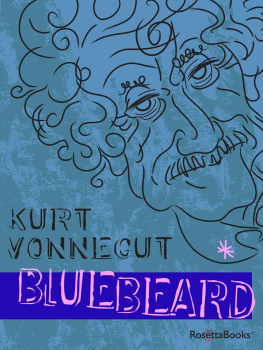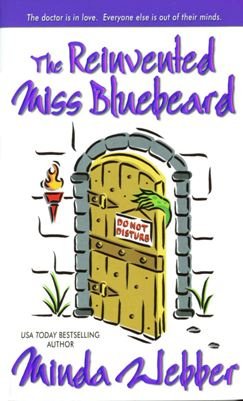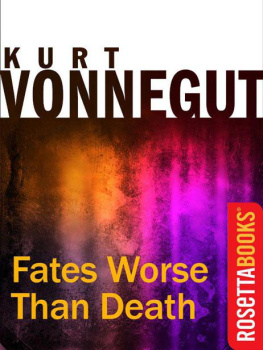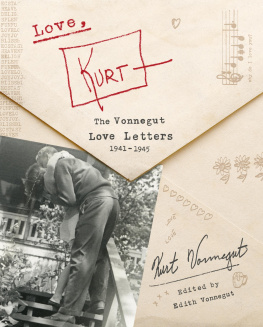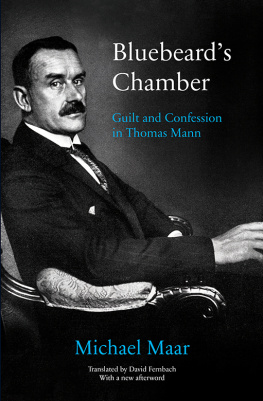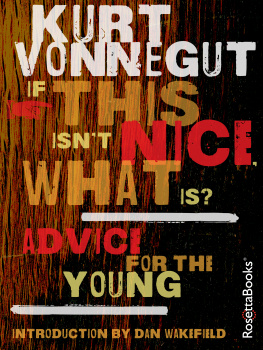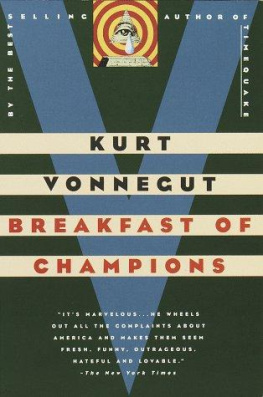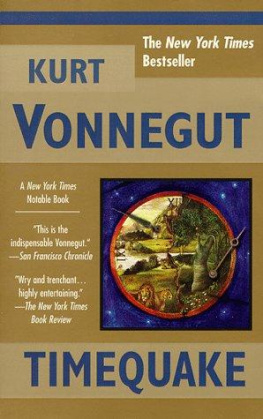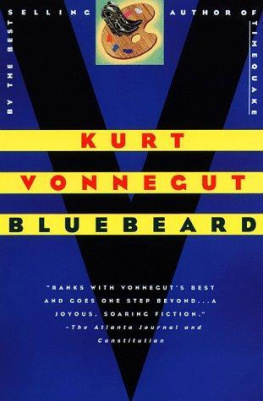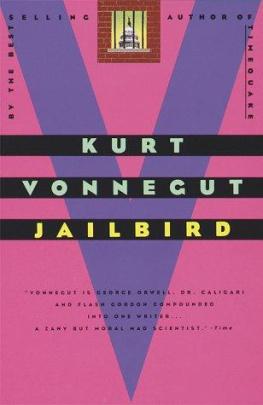Vonnegut - Bluebeard: The Autobiography of Rabo Karabekian (1916-1988)
Here you can read online Vonnegut - Bluebeard: The Autobiography of Rabo Karabekian (1916-1988) full text of the book (entire story) in english for free. Download pdf and epub, get meaning, cover and reviews about this ebook. year: 2011, publisher: RosettaBooks, genre: Art. Description of the work, (preface) as well as reviews are available. Best literature library LitArk.com created for fans of good reading and offers a wide selection of genres:
Romance novel
Science fiction
Adventure
Detective
Science
History
Home and family
Prose
Art
Politics
Computer
Non-fiction
Religion
Business
Children
Humor
Choose a favorite category and find really read worthwhile books. Enjoy immersion in the world of imagination, feel the emotions of the characters or learn something new for yourself, make an fascinating discovery.
Bluebeard: The Autobiography of Rabo Karabekian (1916-1988): summary, description and annotation
We offer to read an annotation, description, summary or preface (depends on what the author of the book "Bluebeard: The Autobiography of Rabo Karabekian (1916-1988)" wrote himself). If you haven't found the necessary information about the book — write in the comments, we will try to find it.
Bluebeard: The Autobiography of Rabo Karabekian (1916-1988) — read online for free the complete book (whole text) full work
Below is the text of the book, divided by pages. System saving the place of the last page read, allows you to conveniently read the book "Bluebeard: The Autobiography of Rabo Karabekian (1916-1988)" online for free, without having to search again every time where you left off. Put a bookmark, and you can go to the page where you finished reading at any time.
Font size:
Interval:
Bookmark:
Bluebeard
The Autobiography of Rabo Karabekian (19161988)
Kurt Vonnegut
Copyright
Bluebeard
Copyright 1987 by Kurt Vonnegut
Cover art to the electronic edition copyright 2014 by RosettaBooks, LLC
This is a work of fiction. Names, characters, places and incidents are either the product of the authors imagination or are used fictitiously, and any resemblance to actual person, living or dead, business establishments, events or locales is entirely coincidental.
All rights reserved. No part of this book may be used or reproduced in any manner whatsoever without written permission except in the case of brief quotations embodied in critical articles and reviews.
Cover design by Justin Kellis/KICK Design.
Electronic edition published 2011 by RosettaBooks LLC, New York.
ISBN Mobipocket edition: 9780795319334
This is a novel, and a hoax autobiography at that. It is not to be taken as a responsible history of the Abstract Expressionist school of painting, the first major art movement to originate in the United States of America. It is a history of nothing but my own idiosyncratic responses to this or that.
Rabo Karabekian never lived, and neither did Terry Kitchen or Circe Berman or Paul Slazinger or Dan Gregory or Edith Taft or Marilee Kemp or any of the other major characters in this book. As for real and famous persons I mention: I have them do nothing that they did not actually do when tested on this proving ground.
May I say, too, that much of what I put in this book was inspired by the grotesque prices paid for works of art during the past century. Tremendous concentrations of paper wealth have made it possible for a few persons or institutions to endow certain sorts of human playfulness with inappropriate and hence distressing seriousness. I think not only of the mudpies of art, but of childrens games as wellrunning, jumping, catching, throwing.
Or dancing.
Or singing songs.
K.V.
We are here to help each other get
through this thing, whatever it is.
Dr. Mark Vonnegut, M.D.
(Letter to Author, 1985)
This book is for Circe Berman.
What else can I say?
R.K.
Having written The End to this story of my life, I find it prudent to scamper back here to before the beginning, to my front door, so to speak, and to make this apology to arriving guests: I promised you an autobiography, but something went wrong in the kitchen. It turns out to be a diary of this past troubled summer, too! We can always send out for pizzas if necessary. Come in, come in.
***
I am the erstwhile American painter Rabo Karabekian, a one-eyed man. I was born of immigrant parents in San Ignacio, California, in 1916. I begin this autobiography seventy-one years later. To those unfamiliar with the ancient mysteries of arithmetic, that makes this year 1987.
I was not born a cyclops. I was deprived of my left eye while commanding a platoon of Army Engineers, curiously enough artists of one sort or another in civilian life, in Luxembourg near the end of World War Two. We were specialists in camouflage, but at that time were fighting for our lives as ordinary infantry. The unit was composed of artists, since it was the theory of someone in the Army that we would be especially good at camouflage.
And so we were! And we were! What hallucinations we gave the Germans as to what was dangerous to them behind our lines, and what was not. Yes, and we were allowed to live like artists, too, hilariously careless in matters of dress and military courtesy. We were never attached to a unit as quotidian as a division or even a corps. We were under orders which came directly from the Supreme Headquarters of the Allied Expeditionary Force, which assigned us temporarily to this or that general, who had heard of our astonishing illusions. He was our patron for just a little while, permissive and fascinated and finally grateful.
Then off we went again.
Since I had joined the regular Army and become a lieutenant two years before the United States backed into the war, I might have attained the rank of lieutenant colonel at least by the end of the war. But I refused all promotions beyond captain in order to remain with my happy family of thirty-six men. That was my first experience with a family that large. My second came after the war, when I found myself a friend and seeming peer of those American painters who have now entered art history as founders of the Abstract Expressionist school.
***
My mother and father had families bigger than those two of mine back in the Old Worldand of course their relatives back there were blood relatives. They lost their blood relatives to a massacre by the Turkish Empire of about one million of its Armenian citizens, who were thought to be treacherous for two reasons: first because they were clever and educated, and second because so many of them had relatives on the other side of Turkeys border with its enemy, the Russian Empire.
It was an age of Empires. So is this one, not all that well disguised.
***
The German Empire, allied with the Turks, sent impassive military observers to evaluate this centurys first genocide, a word which did not exist in any language then. The word is now understood everywhere to mean a carefully planned effort to kill every member, be it man, woman, or child, of a perceived subfamily of the human race.
The problems presented by such ambitious projects are purely industrial: how to kill that many big, resourceful animals cheaply and quickly, make sure that nobody gets away, and dispose of mountains of meat and bones afterwards. The Turks, in their pioneering effort, had neither the aptitude for really big business nor the specialized machinery required. The Germans would exhibit both par excellence only one quarter of a century later. The Turks simply took all the Armenians they could find in their homes or places of work or refreshment or play or worship or education or whatever, marched them out into the countryside, and kept them away from food and water and shelter, and shot and bashed them and so on until they all appeared to be dead. It was up to dogs and vultures and rodents and so on, and finally worms, to clean up the mess afterwards.
My mother, who wasnt yet my mother, only pretended to be dead among the corpses.
My father, who wasnt yet her husband, hid in the shit and piss of a privy behind the schoolhouse where he was a teacher when the soldiers came. The school day was over, and my father-to-be was all alone in the schoolhouse writing poetry, he told me one time. Then he heard the soldiers coming and understood what they meant to do. Father never saw or heard the actual killing. For him, the stillness of the village, of which he was the only inhabitant at nightfall, all covered with shit and piss, was his most terrible memory of the massacre.
***
Although my mothers memories from the Old World were more gruesome than my fathers, since she was right there in the killing fields, she somehow managed to put the massacre behind her and find much to like in the United States, and to daydream about a family future here.
My father never did.
***
I am a widower. My wife, ne Edith Taft, who was my second such, died two years ago. She left me this nineteen-room house on the waterfront of East Hampton, Long Island, which had been in her Anglo-Saxon family from Cincinnati, Ohio, for three generations. Her ancestors surely never expected it to fall into the hands of a man with a name as exotic as Rabo Karabekian.
If they haunt this place, they do it with such Episcopalian good manners that no one has so far noticed them. If I were to come upon the spook of one of them on the grand staircase, and he or she indicated that I had no rights to this house, I would say this to him or her: Blame the Statue of Liberty.
Next pageFont size:
Interval:
Bookmark:
Similar books «Bluebeard: The Autobiography of Rabo Karabekian (1916-1988)»
Look at similar books to Bluebeard: The Autobiography of Rabo Karabekian (1916-1988). We have selected literature similar in name and meaning in the hope of providing readers with more options to find new, interesting, not yet read works.
Discussion, reviews of the book Bluebeard: The Autobiography of Rabo Karabekian (1916-1988) and just readers' own opinions. Leave your comments, write what you think about the work, its meaning or the main characters. Specify what exactly you liked and what you didn't like, and why you think so.

